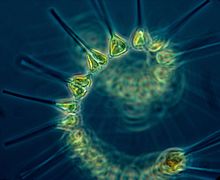phytoplankton, which are responsible for half of the world’s primary production and are the basis of all marine ecosystems, have been declining for more than 100 years, perhaps the result of rising sea temperatures, according to a study published in this week’s Nature — a cause for concern about the health of the Earth’s oceans. A number of marine diatom cells, animportant group of phytoplankton in the oceans.Image: Harry Taylor,courtesy of Nikon Small world”It is troubling,”….
Phytoplankton, which are responsible for half of the world’s primary production and are the basis of all marine ecosystems, have been declining for more than 100 years, perhaps the result of rising sea temperatures, according to a study published in this week’s Nature — a cause for concern about the health of the Earth’s oceans.
“It is troubling,” said marine scientist linkurl:David Siegel;http://www.geog.ucsb.edu/people/faculty/david-siegel.html of the University of California, Santa Barbara, who was not involved in the research. With data dating back to the late 1800s, “this paper finds a long-term trend that’s huge,” he said. “The phytoplankton community has undoubtedly been changing.” Phytoplankton productivity lies at the base of the marine food web, supporting all ocean life and contributing to global geochemical processes, including the carbon cycle. Through photosynthetic activities, phytoplankton reduce atmospheric carbon dioxide. Satellite data from the last few decades has suggested that phytoplankton might be on the decline. To determine whether these apparent declines are indicative of a longer-term trend, marine biologist linkurl:Boris Worm;http://wormlab.biology.dal.ca/ of Dalhousie University in Canada and his colleagues turned to data from a variety of sources, including direct measurements of chlorophyll levels, a pigment found in all phytoplankton, and Secchi disk data. Secchi disks are a simple yet fundamental tool in oceanography, and are used to measure water transparency, which can serve as a proxy for phytoplankton abundance. Compiling and standardizing these data, dating back to 1899, the researchers found a consistent and significant decline in phytoplankton in eight of the world’s 10 oceans — an estimated 1 percent per year globally. The decline was strongly correlated with the rising surface sea temperatures. “One percent per year is a huge number,” said Siegel, who wrote an accompanying News and Views article. The impacts of such a decline are significant, agreed aquatic microbiologist linkurl:Hugo Sarmento;http://www.icm.csic.es/bio/projects/icmicrobis/fitxes/Personal_webs/Sarmento/ of the Institute of Marine Sciences in Barcelona, Spain, who did not participate in the study. “The balance in the ocean is based on photosynthesis of phytoplankton and respiration of the bacteria, so the balance of the CO2 [and] oxygen in the water [might shift].” This could be bad news for ocean acidification, which will increase with higher CO2 levels, as well as the rising levels of atmospheric CO2, he said. “[If] the water [becomes] saturated with CO2, the sea could stop being a receptor of CO2 from the atmosphere and actually become an emission source, [which] could actually increase the effects of climate change.” One caveat, Worm noted, is that the measures of water transparency and chlorophyll levels are merely proxies for phytoplankton abundance. “We can confidently say that phytoplankton has declined over the last 100 years,” he said, “but the exact magnitude of the decline and what this means for ocean life, we need to do more work on.” If phytoplankton is indeed declining at the estimated 1 percent per year, “it would be a very concerning aspect of global change in the ocean.”







